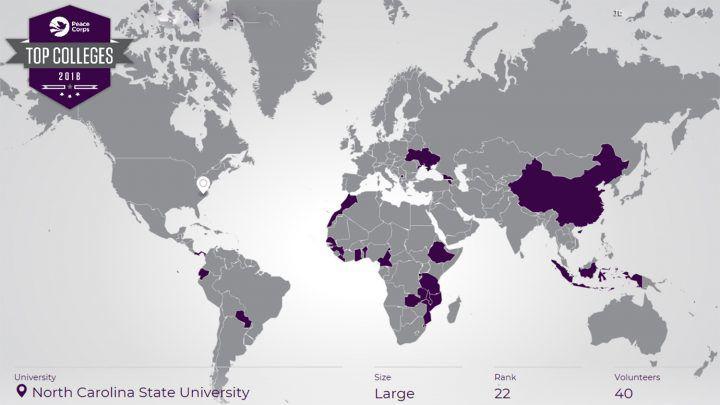
Courtesy of NC State News
The Peace Corps has volunteers from all over the country, but NC State has the 12th largest volunteer base. With the variety of opportunities NC State provides, students are given access to volunteer opportunities while pursuing their degrees which has led to more student interest in joining after graduation.
NC State alumna Anna Martin is an NC State Peace Corps recruiter having formerly spent time with the Corps in Africa. She now shares with students why they may want to consider the Peace Corps after graduation.
“Sometimes I get blank stares in the classrooms from people because they never thought about using their skills outside of North Carolina or the U.S.,” Martin said. “When they hear there is a chance for them to use their skills in a unique way, I often hear from them a week later wanting to know how they can use their agriculture or engineering skills outside of the normal realm.”
Martin hosts a variety of different information sessions with other volunteers that have served in different areas to give students more information about what it is like to serve abroad. She also emphasizes that there are many opportunities on campus that encourage students and give them a taste of what it is like to not only travel abroad, but to volunteer abroad.
“There are so many different opportunities around campus that encourage students to go abroad, such as the alternative spring breaks where they can serve abroad, or even opportunities to serve in the Raleigh-Durham area with different communities,” Martin said. “There are a lot of different opportunities that introduce NC State students to serving in other countries.”
Adam Culley, the assistant director of CSLEPS, is in charge of the Alternative Service Break program and attests to the fact that the trips are a good stepping stone for students looking to serve abroad.
“The alternative service break trips are not voluntourism trips, but experiences where the focus is to immerse students in learning about the different communities they are staying in,” Culley said. “Students learn about the different social justice issues associated with different communities and engage in service-learning experiences.”
For students interested in traveling abroad who cannot spend a whole semester abroad due to class schedules or other outside factors, the trips provide students a chance to glance into what it may be like to experience other communities without the initial long-term commitment.
Culley and Martin both encourage students to study abroad if they have the chance, go on one of the alternative service break trips or spend time volunteering in their communities.
The Alternative Service Break trips also have an academic learning angle to them since students must prep for the trips beforehand to learn about leadership, budgets, and how to make meaningful connections. The skills and information learned through these trips are ideal for preparation to potentially joining the Peace Corps after graduation where they are able to utilize these skills as well as skills associated with their majors.
To learn more about these opportunities students can find alternative service break information at the CSLEPS website and email [email protected] to ask specific questions regarding the Peace Corps.